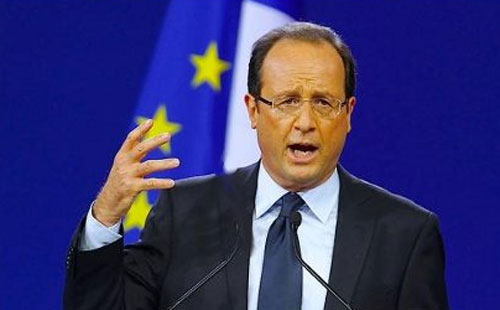French Leader Presses G-20 to Denounce Assad
ST. PETERSBURG, Russia—French President François Hollande pressed European leaders attending the Group of 20 summit here to support a statement denouncing the Syrian regime, but divisions remained and Russian resistance persisted.
“It’s really important that the Europeans here at the G-20 are on the same page in condemning the use of chemical arms and condemning the regime that used them,” said the French leader, who has been the lone Western ally supporting U.S. President Barack Obama‘s push for military action in Syria.
Italian Prime Minister Enrico Letta said G-20 leaders at the two-day summit here were divided over whether to back punitive military strikes on the regime of Syrian President Bashar al-Assad, citing concerns over the scope and scale of potential U.S. military action.
Mr. Letta, who spoke after meeting with Russian President Vladimir Putin—the Assad regime’s leading ally here—said some world leaders doubted Mr. Obama would be able to limit military engagement to his stated aim of carrying out punitive strikes against the Assad regime for what the U.S. says is its use of chemical weapons in a massacre outside Damascus on Aug. 21.
“There are some who interpret this as the start of something of which we don’t know the end,” Mr. Letta said. “These are obviously two very different scenarios, and I’m sure that’s part of what’s blocking things and creating so much difficulty.”
Mr. Obama is facing a challenge in getting congressional authorization for his decision to attack, and European leaders face their own domestic political concerns regarding an attack.
Messrs. Obama and Putin briefly traded pleasantries during the opening ceremony Thursday in St. Petersburg. U.S. and Russian aides said they anticipated the men would speak during the two-day meeting, though nothing formal is scheduled.
A European agreement on whether Mr. Assad’s regime carried out chemical attacks, as France and the U.S. have concluded, could strengthen Mr. Hollande’s hand as he seeks to rally support for French participation in strikes against the Assad regime.
The British government said Thursday it had fresh evidence of chemical weapons use in Syria during the recent attacks near Damascus, but was unable to identify the scale of use.
Without the backing of other European neighbors, Mr. Hollande risks isolation within the European Union. European Council President Herman Van Rompuy noted on Thursday that “only France is ready” to join the U.S. in an attack.
Mr. Hollande noted that he and Mr. Putin “don’t have the same response, for now, to the chemical attack.”
Messrs. Putin and Hollande spoke for two minutes on the sidelines of the summit, a French official said, adding that Mr. Putin patted Mr. Hollande on the shoulder.
German Foreign Minister Guido Westerwelle met here Thursday with his Russian counterpart Sergei Lavrov. Mr. Westerwelle expressed frustration with the position of the Kremlin, which has continued to question findings that the Assad regime was responsible for chemical attacks on Aug. 21, which the U.S. says killed over 1,400 people, including more than 400 children.
“We’re going to use every small chance to find a political solution,” Mr. Westerwelle said several hours into the unusually tense G-20 summit. “Whether we’ll succeed is, quite rightly, a big question mark.”
“In my view it can’t be expected, for example, that the Russian side will undertake a complete turn in its politics in regards to Syria,” Mr. Westerwelle said.
Mr. Letta, the Italian prime minister, didn’t specify which leaders attending were skeptical of Mr. Obama’s plans to strike Syria, and he sidestepped questions about whether Italy would eventually endorse the strikes. Members of the European Union, he noted, are trying to hash out a common position on the matter.
Mr. Letta said Italy in principle opposed unilateral strikes, lacking a mandate from the United Nations. Relations between Rome and Washington over Syria were in a “delicate phase,” Mr. Letta said, adding: “We have different approaches when it comes to this issue.”
The Italian premier said it “seemed” the Assad regime was behind the Aug. 21 attack on the outskirts of Damascus, where Washington says more than 1,400 people died from a chemical arms attack.


